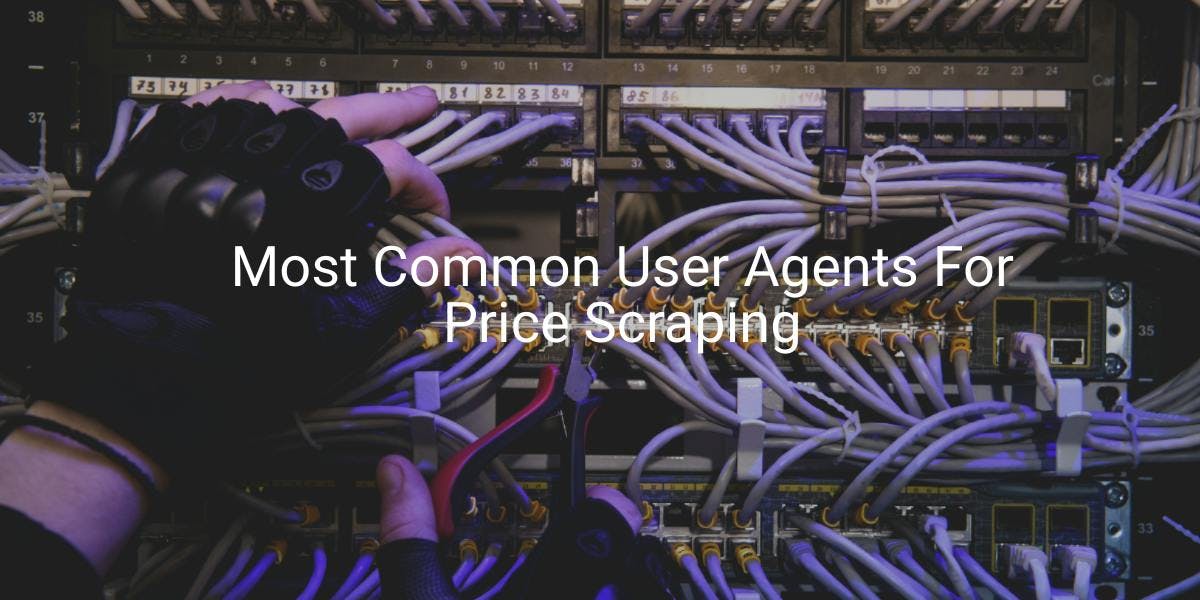Most Common User Agents For Price Scraping
Flipnode on Apr 20 2023

In the rapidly changing business landscape of today, data extraction is crucial for market research, making web scraping an increasingly popular concept. For businesses, obtaining information is a key component in capturing a larger market share. However, collecting data can be a time-consuming process. By automating the process with web scraping, businesses can focus on other tasks.
Pricing information is particularly important for companies looking to remain competitive in the market. It plays a critical role in shaping overall strategy and adjusting prices in relation to competitors.
If you are considering implementing price scraping for your company, there are several challenges associated with web scraping that you should be aware of. These include complicated web page structures, CAPTCHA, login requirements, IP blocking, and more. In this article, we will explore how to avoid being blocked by target servers by discussing user agents and their relationship to price scraping.
Before diving into the specifics, it is important to define some key terms.
What is web scraping?
Web scraping is the act of extracting desired public data and importing the resulting information onto your computer or into a local file. In today's business environment, web scraping has become a critical tool for business development.
What is price scraping?
Price scraping involves using a web crawler or bot to extract price data. The process involves searching and copying data from websites for later analysis. While it may seem straightforward and something that can be done manually, price scraping tools can significantly save time, particularly when extracting data from multiple websites. Once the data is collected, it can be analyzed to help businesses develop effective pricing strategies, including promotions, discounts, special offers, and more.
What is user agent?
Were you aware that every individual browsing the internet has a user agent? Essentially, a user agent serves as the user's representative on the internet. However, what exactly does the user agent represent the user to? In other words, what is a user agent?
The user agent acts as a link between the user and the internet. Imagine having to specify details about your browser, operating system, software, and device type every time you visit a website. Navigating the internet would be a cumbersome and time-consuming process. This is precisely why every browser comes equipped with a user agent.
For instance, here is an example of user agent information:
Mozilla/5.0 (Macintosh; Intel Mac OS X 10_15_2) AppleWebKit/605.1.15 (KHTML, like Gecko) Safari/605.1.15 Version/13.0.4
When a browser connects to a website, the user agent string is incorporated into the website's HTTP header. But why does a website require information about the user? The web server uses this data to tailor the content to specific web browsers and diverse operating systems.
What are the most popular user agents?
Determining the most prevalent user agents is a challenging task since they are continually changing with the introduction of new browsers or the emergence of new user agents.
User agents for price scraping
Price scraping is a crucial form of web scraping for any business, particularly for e-commerce companies that rely on monitoring their competitors' real-time product selling prices.
However, some websites may block scraping due to their reluctance to provide open access to their data. There are various ways to prevent web scraping, with one of the most common being blocking requests from user agents that do not belong to mainstream browsers. It is one of the first steps taken by data sources to identify suspicious requests.
During web scraping, web servers receive multiple requests, and identical user agents may raise suspicions of suspicious activity. Most web scrapers do not bother to alter their user agents, but as you now realize, it is essential to do so.
Furthermore, it is essential to keep the user agents up to date as every browser or operating system changes its user agents.
What is user agent identifier?
The user agent identifier is a tool that many websites use to facilitate the identification of user agents. With the proliferation of automated bots, mobile devices, and desktop browsers in various forms, it has become challenging to determine what a particular user agent represents. The user agent identifier is an updated database that includes the latest user agents and bot signatures.
Most common user agents for price scraping
When it comes to price scraping, there are no unique user agents to use. As you may already know, it is essential to use the most commonly used user agents for web scraping to avoid being blocked by the data resource server. If you use outdated or uncommon user agents, there is a high probability that the web server will flag the web scraping process as suspicious, and you may be blocked.
What is a Web Scraper API?
The Web Scraper API is a powerful data extraction tool designed specifically for extracting data from a wide range of websites, ensuring a high success rate in delivering the required data.
Wrapping it up
To sum up, a user agent serves as a mediator between the user and the internet, providing relevant information about the user's browser, software, and device type to web servers. This information allows web servers to display customized web pages for users. By configuring popular user agents for price scraping, the likelihood of being blocked by targeted servers is reduced as it is one of the initial checks used to identify suspicious requests.
